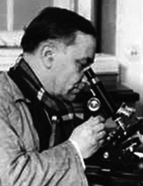

Abel Salazar (AS) was born on 19 July 1889 in the city of Guimarães, the son of Adelaide da Luz Silva Lima and Adolfo Barroso Pereira Salazar. His father studied medicine in Coimbra, organised the library of the Martins Sarmento Society and wrote for the Revista de Guimarães , showing great interest in the arts and public affairs. He taught French at industrial schools in Guimarães and Porto. The young AS attended the Guimarães Seminary-High School before leaving for Porto in the autumn of 1903; this initial experience in a Portuguese town where ecclesiastical ritualisation often went hand in hand with hypocrisy and dissimulation awakened in Abel Salazar an anti-clerical attitude, sensitive as he was to genuine religious sentiment.
In 1909, he enrolled at the Porto Medical-Surgical School, brilliantly completing his medical degree (1915) with a dissertation entitled Ensaio de Psicologia Filosófica (Essay on Philosophical Psychology). Living in Matosinhos, he remained somewhat distant from the leaders of the Portuguese Renaissance movement, the nostalgia of Teixeira Pascoais and the creationist Bergsonism of the philosopher Leonardo Coimbra. Between 1916 and 1935, he taught and conducted research (which earned him international prestige, particularly for his tano-ferric method) at the Faculdade de Medicina da Universidade do Porto [School of Medicine of the University of Porto], and in 1918 he was appointed professor of Histology and Embryology. From 1932 onwards, realising the harmful constraints imposed on scientific research by the Estado Novo regime, he committed himself, as a publicist, on a crusade to change mentalities, inspired by a positivist republican ideal, publishing articles in newspapers and giving lectures at associations associated with the opposition. In these activities, he had the support of the Freemasons, one of the main opponents of the regime, of which he became a member. His civic and political stance and the intrigues of some of his colleagues led to his expulsion from the University (1935); he returned to research in 1941 at the Faculdade de Farmácia [School of Pharmacy] in Porto. Removed from academic life, his vocation as a polymath became more evident, and he became widely active as a publicist, artist and essayist, developing a theoretical thinking on topics ranging from art to science, from Viennese logical positivism to the philosophy of history. Many of these writings appeared in periodicals, generally linked to sectors opposed to the Estado Novo ( Seara Nova , Sol Nascente , of which he was a central figure, O Diabo, etc.).
This work is financed by national funds through FCT - Foundation for Science and Technology, I.P, in the scope of the projects UIDB/04311/2020 and UIDP/04311/2020.
